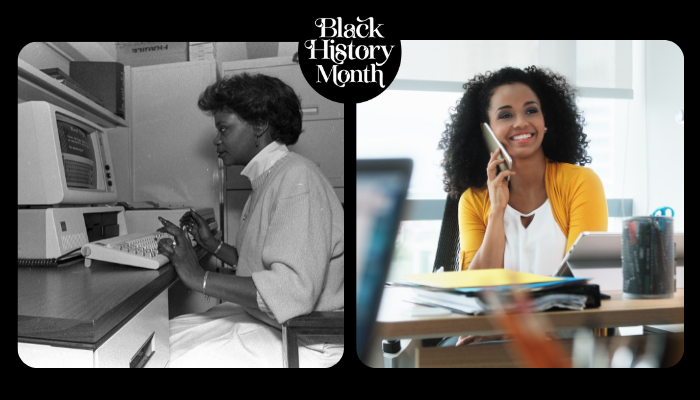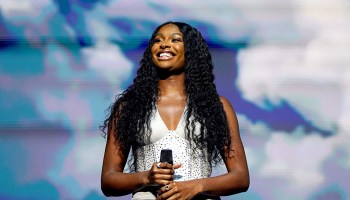The Power Of The Crown: On Black Women & History Of Hair In The Workplace
How It Started vs How Its Going: Black Women Don’t Care If You Like Their Hair In The Workplace

Source: @IndiaMonee / Radio One Digital
Although Black women have preached India Arie’s “I am not my hair” lyrics or something along the lines for years, hair has always been a huge priority in the African-American community. Terms like “good hair” and “nappy” have been used over generations to create a classist system within the community. That doesn’t stop in the workplace.
Hair has been a staple of femininity, and black women take their hairstyles very seriously. JSTOR cites women have been adjusting their hair since slavery. It started when enslaved women covered their hair due to harsh working conditions outside, and women who worked inside the home “sometimes mimicked the hairstyles of their enslavers, either by wearing wigs” during slavery.
In the 19th century, Madam C.J. Walker created the hot comb that gave black women the opportunity to “tame” or straighten their hair which would later become the preferred social norm. Black women were made fun of because of their textured hair when others compared it to wool and called it nappy. From music, movies, and society, natural hair became “unacceptable” because of its look. The public prefers straightened hair which forced black women to fit into societal pressures.
SEE ALSO: Good Hair, Bad Hair: 5 Films That Explore The Nuances Of Black Hair
Just like in Spike Lee’s School Daze, the director displayed the class divide between women who wore afros and the women who preferred straightened longer hair. The group that decided to embrace their naturalness were called “jigaboos.” In return, the blackness of women who straightened their hair was questioned.
It wasn’t until the Black Panther movement that the afro was popularized, and black people started to wear their natural hair with pride. JSTOR credits Angela Davis to be one of the pioneers to wear her afro to go against the typical white American beauty standards. During the 1960s, “wearing an afro became a weapon in the fight for racial equality, as well as a public declaration of self-love and solidarity within the black community.” The move led protestors to demand the Civil Rights Act of 1964 be signed. The Act initiated the end of segregation in public places and banned employment discrimination. Though The Act worked to create an equal workplace, black hair would not be considered in that equation.
Hair standards were not only a battle within the black community but, of course, it bled over into the workplace. Black men and women have had a history with their hair being an issue in corporate America to fit in a mold made by their other counterparts.
“If a black person was going to be part of corporate culture, they would be expected to not only dress the part but dress their hair the part,” Lori Tharps, professor at Temple University and co-author of Hair Story: Untangling the Roots of Black Hair in America said.
Fast forward to modern times with the rise of diversity awareness and the growth of the natural hair community, the discussion of what is considered “professional” started to open. Employees began to look at their company’s grooming policies and speak up and take action against biases toward black hair.
“Hair discrimination is racial discrimination, and we ought to recognize that at the national level, too,” former Democratic presidential candidate Pete Buttigieg said at Essence Fest in 2019.
What’s Trending: Is It Ok If Non-Black Women Wear Black Hairstyles!? [WATCH]
There are plenty of widely-known cases of racial discrimination in schools and the workplace that have gained public attention. Many people have taken legal action to prove appearance discrimination but didn’t succeed due to legal expenses and the gaps within laws.
According to the Washington Post, Esi Eggleston Bracey, the beauty and personal care lead for Unilever in North America and California state Sen. Holly J. Mitchell (D), started to make a difference for the natural hair community. From the inspiration came the CROWN Act (“Create a Respectful and Open Workplace for Natural Hair”). Bracey spoke with the National Black Caucus of State Legislators, expressing her commitment to textured hair. Mitchell says Bracey’s interview connected with her own experience and those black women around her.
“It’s not just about hair. It’s about choice and about people being empowered to be who they are culturally in the workplace,” Mitchell said in an interview.
Everything You Need To Know About The CROWN Act
TheCrownAct.com says it’s ending hair discrimination “to ensure protection against discrimination based on race-based hairstyles by extending statutory protection to hair texture and protective styles such as braids, locs, twists, and knots in the workplace and public schools.” The official campaign was created in 2019 and founded by Dove, National Urban League, Color Of Change, and Western Center on Law & Poverty. Since its start, it has become a law in 14 states with 36 more to go.
Black men and women should have the luxury to show up as their authentic selves. Whether working from home or showing up in the office, black people deserve to express themselves freely. How black hair in the workplace started in the fields of ancestors to now black women coming together to spread country-wide laws is a huge transformation that will impact generations to come.
















